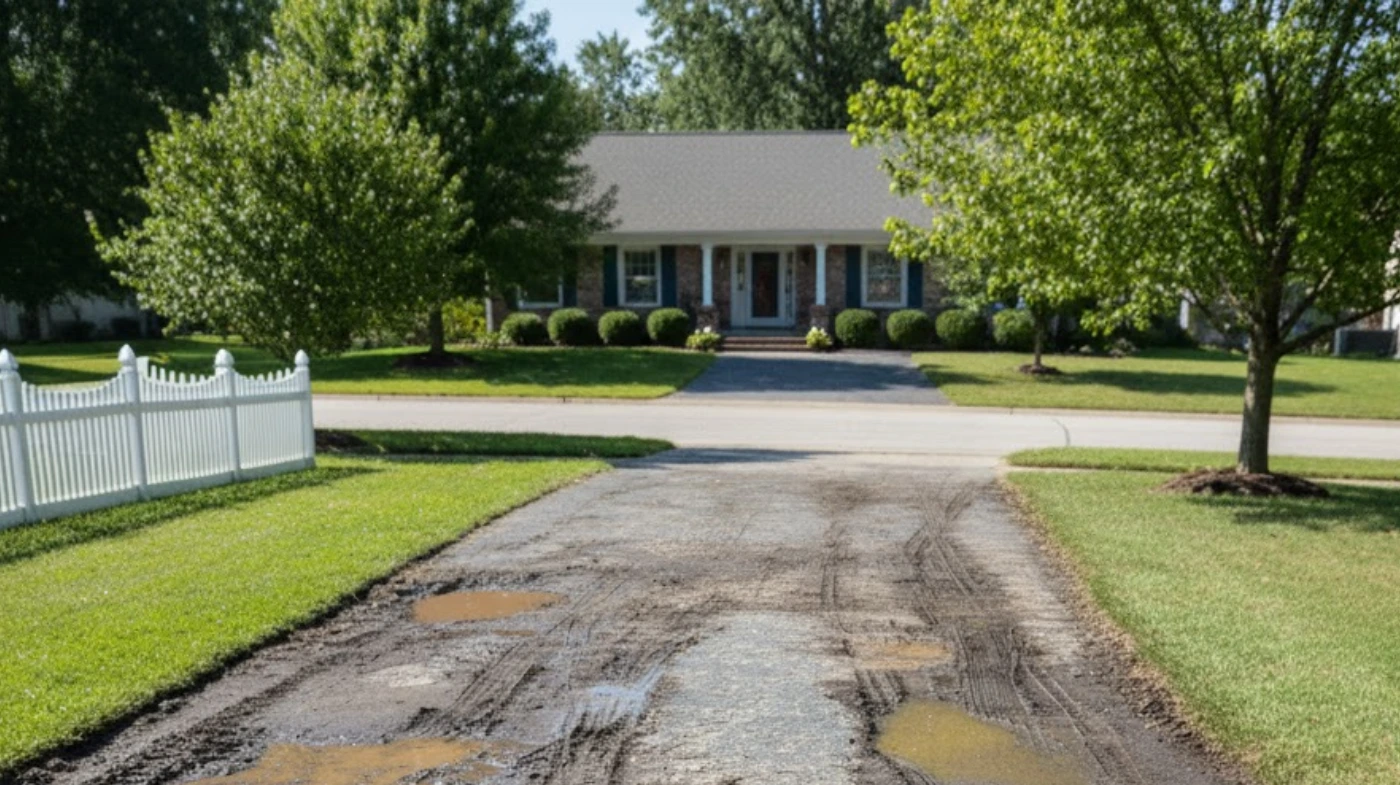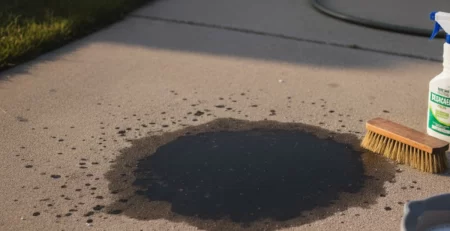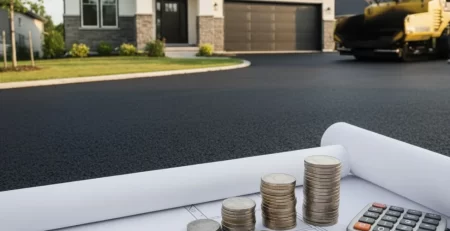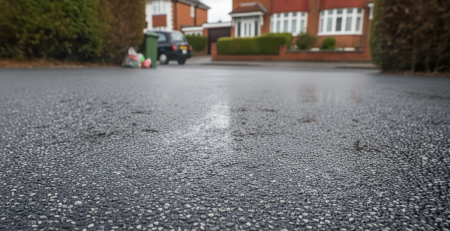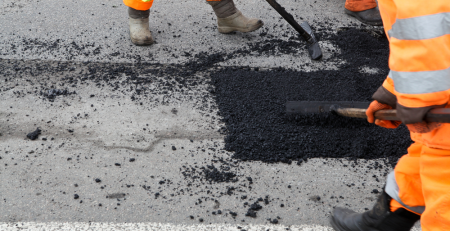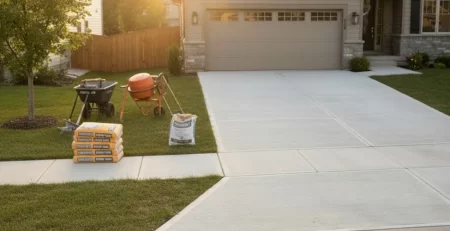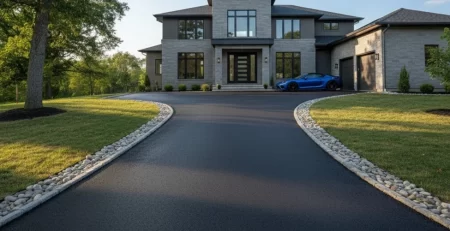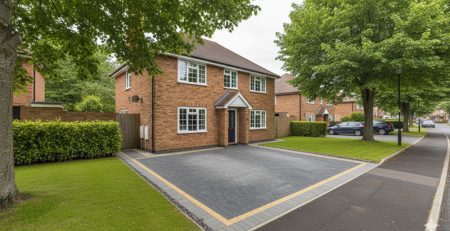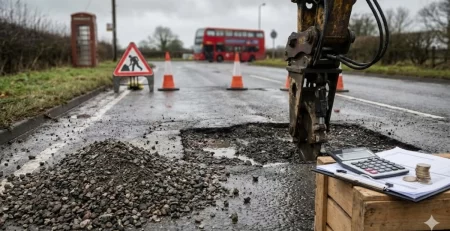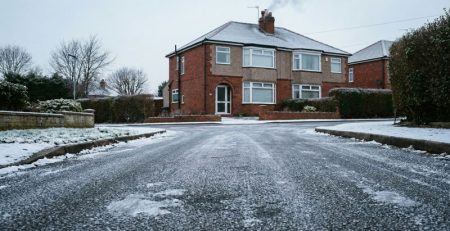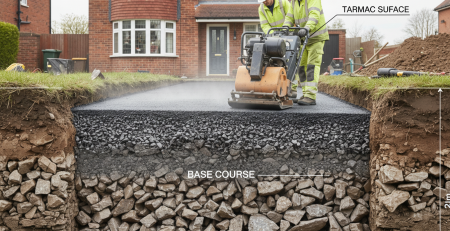Muddy Driveway Repair That Stays Solid All Year Round in the UK: Reasons and Solutions
Muddy driveways ruin kerb appeal and make every journey home a struggle across the UK. Water pooling, sinking surfaces, and relentless puddles signal deeper structural failures that worsen with each rainfall.
This comprehensive guide reveals proven repair strategies that eliminate mud permanently, not temporarily. You’ll discover the exact materials professional contractors use, step-by-step repair processes that address root causes, and maintenance secrets that keep driveways solid through UK winters and summers.
Why Do Driveways Become Muddy?
Understanding the root causes of muddy driveways helps you address the problem effectively rather than applying quick fixes that fail within weeks.
Poor Drainage Systems
Most driveway drainage problems stem from inadequate water management. When rainwater has nowhere to go, it settles on the surface and seeps into the substrate. This creates soft, muddy patches that worsen with vehicle traffic. Without proper slope or drainage channels, standing water becomes a constant issue.
Unsuitable Base Materials
Many driveways fail because the foundation layers were never designed to handle moisture or heavy loads. Soil types like clay retain water and become unstable when saturated. Thin gravel layers without proper compaction sink under pressure, allowing mud to rise through gaps.
Heavy Vehicle Traffic
Regular use by cars, vans, or delivery trucks accelerates surface deterioration. The weight pushes down on saturated ground, creating ruts and depressions. These low spots collect more water, creating a cycle of damage that spreads across the entire driveway.
Seasonal Weather Impact
UK winters bring freeze-thaw cycles that crack surfaces, while heavy autumn and spring rains saturate substrates. Summer heat can dry out certain materials, causing them to shrink and crack. Without weather-resistant construction, driveways deteriorate rapidly across changing seasons.
Temporary Fixes vs. Permanent Solutions
Knowing the difference between short-term patches and lasting repairs saves money and prevents recurring problems.
Quick Temporary Methods
Cat litter, sand, or woodchips can absorb surface moisture temporarily. These materials provide traction for a few days but wash away with rain. Filling ruts with loose gravel offers brief relief but requires constant replenishment as stones sink into soft ground.
Why Temporary Fixes Fail?
These solutions address symptoms rather than underlying causes. Water continues pooling because drainage remains inadequate. Soft substrates still lack structural integrity. Within weeks, the mud returns, often worse than before, requiring more frequent interventions.
Benefits of Permanent Solutions
Investing in proper repairs eliminates recurring costs and frustration. Professionally installed systems with permeable resin driveway cost considerations provide decades of service. They handle drainage naturally, resist weather damage, and require minimal maintenance compared to temporary patches.
Step-by-Step Guide to a Solid Driveway Repair
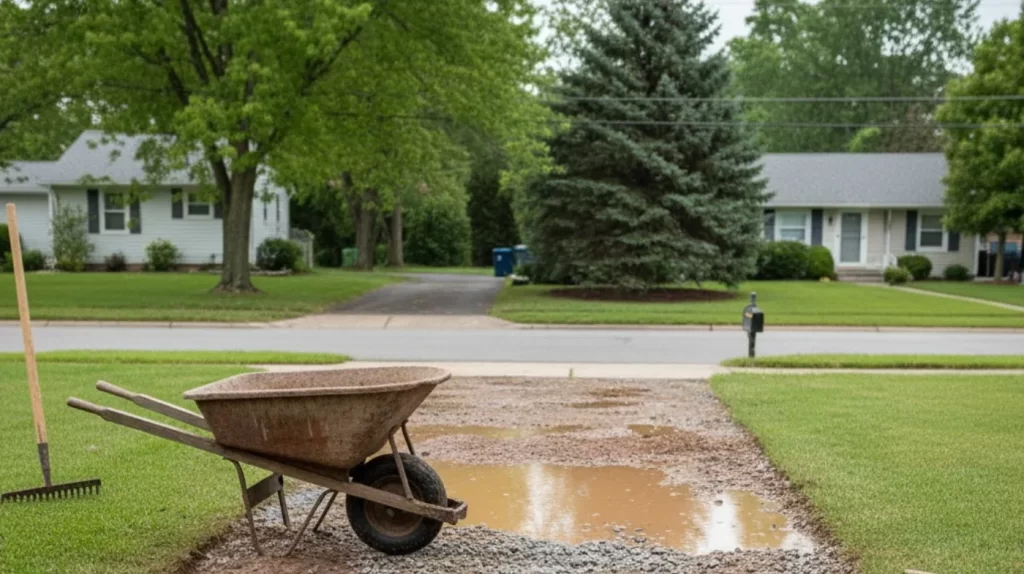
Proper repair requires systematic preparation and quality materials to ensure long-lasting results.
Excavate the Problem Area
Remove the existing muddy surface down to stable ground. This typically means digging 20-30 centimetres deep, depending on soil conditions. Clear away all soft, saturated material that cannot support weight. Proper excavation creates a clean foundation for new layers.
Install Drainage Solutions
Lay perforated pipes along the sides or beneath the driveway to channel water away. Create a slight slope (minimum 1:60) to encourage water flow. Add drainage channels or French drains to prevent future water accumulation. Good drainage is essential for any affordable driveways that last.
Build a Strong Sub-Base
Add a layer of Type 1 crushed stone or MOT hardcore as the foundation. Compact it thoroughly using a vibrating plate compactor to create a solid base. This layer provides road load-bearing capacity and prevents sinking. The thickness depends on expected traffic, typically 10-15 centimetres for residential driveways.
Add a Binding Layer
Place a second layer of smaller crushed stone or gravel over the compacted sub-base. This binding course fills voids and creates a smooth, level surface. Compact again to ensure everything locks together firmly without air pockets.
Apply Final Surface Material
Install your chosen top surface material following manufacturer’s specifications. Whether it is resin paving driveways, tarmac, or concrete, proper installation is crucial. Allow adequate curing time before using the driveway to prevent damage.
Best Materials for Long-Term Driveway Stability
Selecting appropriate materials determines how well your driveway performs across decades.
Resin-bound surfaces offer exceptional durability and permeability. Hiring experienced resin-bound driveways installers in Essex ensures professional installation that handles UK weather conditions.
These surfaces allow water to drain through naturally, preventing puddles and ice formation. They resist cracking, require minimal maintenance, and come in numerous colour options, including coloured resin driveways in the UK.
Tarmac and asphalt remain popular for their road load-bearing capacity and smooth finish. When installed by qualified road surfacing contractors in Hertford, they provide reliable performance for years. Proper base preparation and adequate thickness are essential for longevity.
Permeable paving using natural stone resin driveways combines aesthetics with functionality. These systems allow rainwater to filter through while maintaining structural integrity. The stone resin driveway cost varies depending on aggregate choice and project size.
Concrete offers durability but lacks permeability unless specially designed. It requires expansion joints to prevent cracking and can stain over time. While affordable initially, the cost of bonded resin driveway alternatives often provides better long-term value.
For environmentally conscious homeowners, eco-friendly road surfacing options include recycled materials and permeable systems. These comply with modern drainage regulations while reducing environmental impact.
Maintenance Tips for a Driveway That Lasts All Year
Regular care extends your driveway’s lifespan and prevents small issues from becoming expensive problems.
Regular Cleaning and Inspection
Sweep away debris, leaves, and dirt monthly to prevent drainage blockages. Inspect for cracks, settling, or erosion every season. Early detection allows simple repairs before damage spreads. For resin driveways in the UK, occasional power washing maintains appearance.
Address Minor Damage Promptly
Fill small cracks immediately to prevent water penetration and freeze-thaw damage. Repair loose edges before they crumble. Replace individual damaged sections rather than waiting for widespread failure. Quick action on clear resin driveways in Hertfordshire preserves their seamless appearance.
Maintain Drainage Systems
Keep drainage channels and gullies clear of sediment and vegetation. Check that water flows away from the driveway during heavy rain. Trim overhanging branches that drop excessive leaves. Proper drainage is vital for custom resin driveways to perform as designed.
Protect During Winter
Avoid using metal shovels or harsh de-icing chemicals that damage surfaces. Use plastic shovels and approved de-icers instead. For resin-coated driveways in Hertford, gentle snow removal preserves the finish and prevents surface damage.
When to Call in the Pros?
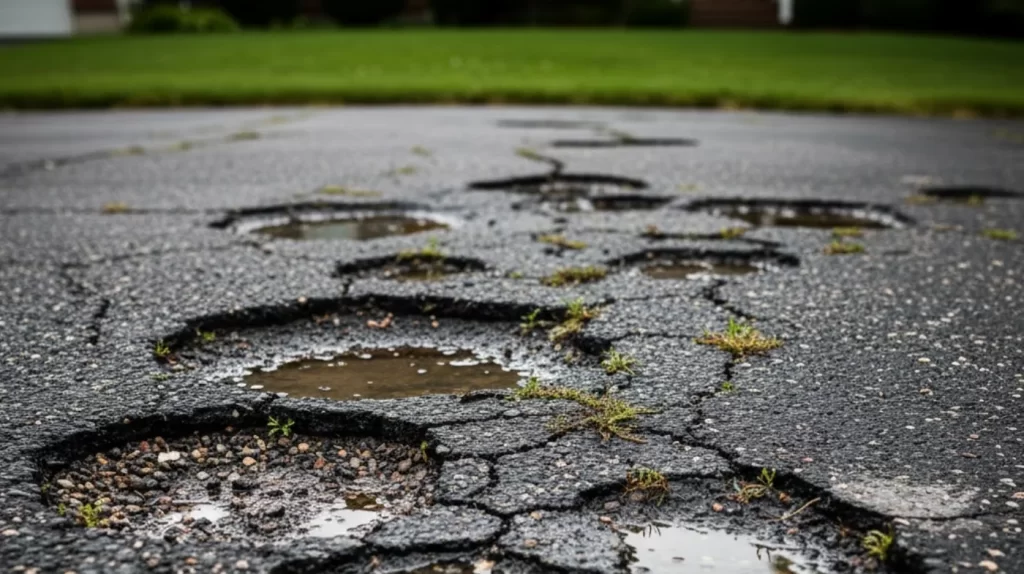
Recognizing when professional help is necessary prevents costly mistakes and ensures quality results.
Complex drainage issues require expert assessment and solutions. If water pools despite your efforts, professionals can design proper drainage systems. They understand local soil conditions, regulations, and effective techniques for challenging sites.
Large-scale repairs or complete driveway installations demand specialized equipment and skills. Road surfacing specialists in the UK have the machinery, materials, and experience to complete projects efficiently. Their work comes with guarantees that DIY repairs cannot match.
Structural problems like significant settling, extensive cracking, or sub-base failure need professional diagnosis. These issues often indicate deeper problems that surface repairs cannot fix. Experts identify root causes and implement comprehensive solutions.
When considering premium surfaces like resin-bound driveways, professional installation ensures proper mixing ratios, curing conditions, and finish quality. The investment in skilled installers protects your long-term investment and maximizes material performance.
UK Locations Supported by Total Surfacing Solutions
Total Surfacing Solutions is recognised for providing durable driveway installations and premium surfacing throughout the UK. We work extensively across Hertfordshire and Essex, offering reliable solutions for properties of every scale.
Hertfordshire:
Our Hertfordshire surfacing services include tarmac driveway construction, resin bound surfacing, road resurfacing, and commercial car park installation. We also specialise in playground surfacing and professional line marking. Every project is completed with careful planning and durable materials to create long-lasting, visually appealing results.
Essex:
In Essex, our expertise covers resin driveways, tarmacadam surfacing, driveway repair and replacement, and commercial resurfacing projects. Schools, councils, and private organisations rely on our playground and sports surfacing solutions in Essex for their strength, safety, and low maintenance needs.
Wherever you’re based within Hertfordshire or Essex, you can count on Total Surfacing Solutions for dependable, professional surfacing.
Frequently Asked Questions
How much does professional muddy driveway repair cost in the UK?
Costs vary significantly based on driveway size, chosen materials, and site conditions. Basic gravel repairs start around £20-30 per square metre, while premium resin paving driveways range from £50-100 per square metre. Excavation, drainage work, and sub-base preparation add to total costs. Request quotes from multiple contractors for accurate pricing.
Can I repair a muddy driveway myself?
Small repairs are manageable for DIY enthusiasts with proper tools and preparation. However, achieving professional results requires experience with excavation, drainage, compaction, and material application.
Mistakes can lead to recurring problems and wasted money. For affordable driveways that last, professional installation often proves more cost-effective long-term.
How long does a properly repaired driveway last?
With quality materials and professional installation, driveways last 20-30 years or more. Resin-bound surfaces and properly laid tarmac typically outlast gravel or basic concrete. Longevity depends on base preparation, drainage quality, material choice, and regular maintenance. Harsh conditions and heavy traffic reduce lifespan.
Are permeable driveways better for muddy conditions?
Permeable surfaces excel in wet conditions by allowing water to drain through naturally. This eliminates standing water and reduces mud formation. Systems using natural stone resin driveways or permeable pavers prevent the drainage problems that cause traditional surfaces to fail. They comply with modern drainage regulations and reduce environmental impact.
Solid Driveways Built to Last
Transforming a muddy driveway into a solid, year-round surface requires understanding root causes, selecting appropriate materials, and implementing proper installation techniques.
Whether you choose resin-bound solutions, traditional tarmac, or modern permeable systems, the key lies in adequate base preparation and effective drainage. Regular maintenance preserves your investment and prevents minor issues from escalating. For complex projects, professional expertise ensures reliable results that withstand UK weather conditions for decades. Take action now to enjoy a functional, attractive driveway regardless of the season.

